Critical Analysis: Strategies for Learning in Education Report
VerifiedAdded on 2022/08/26
|8
|1939
|18
Report
AI Summary
This report presents a critical analysis of the research paper "Strategies for success in education: Time management is more important for part-time than full-time community college students" by MacCann, Fogarty, and Roberts (2012). The analysis examines the paper's central argument, which posits that effective time management significantly influences academic achievement, particularly among part-time students. The report dissects the paper's structure, style, and the evidence used to support its claims, including both primary and secondary research methodologies. The paper's strengths include its focus on non-traditional students and its exploration of the relationship between time management, conscientiousness, and academic performance. The analysis also addresses the limitations of the study, such as its focus on a Western perspective and the complexities of isolating time management as the sole determinant of academic success. The report concludes by emphasizing the relevance of the article and its implications for understanding the non-cognitive factors that contribute to lifelong learning.
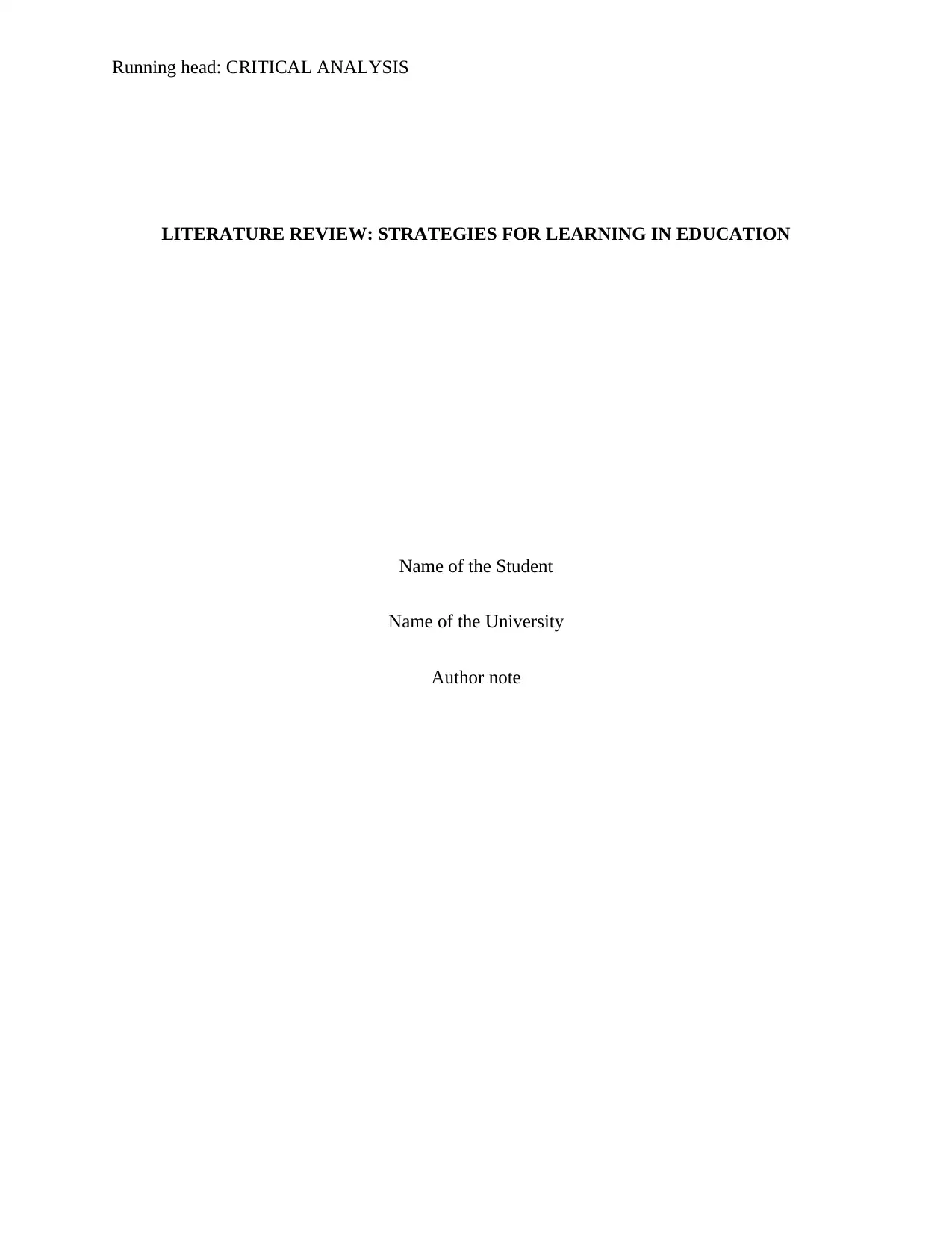
Running head: CRITICAL ANALYSIS
LITERATURE REVIEW: STRATEGIES FOR LEARNING IN EDUCATION
Name of the Student
Name of the University
Author note
LITERATURE REVIEW: STRATEGIES FOR LEARNING IN EDUCATION
Name of the Student
Name of the University
Author note
Paraphrase This Document
Need a fresh take? Get an instant paraphrase of this document with our AI Paraphraser
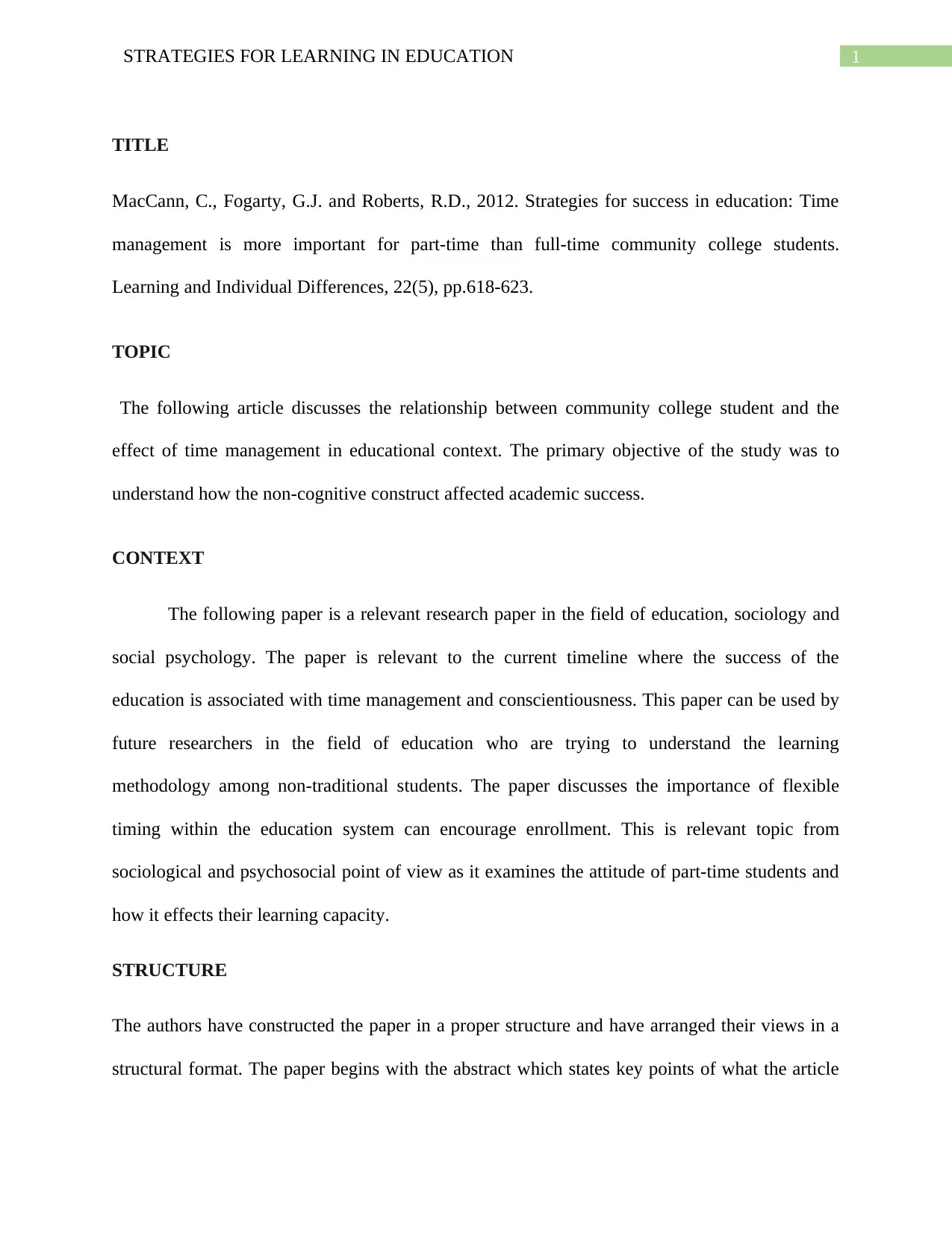
1STRATEGIES FOR LEARNING IN EDUCATION
TITLE
MacCann, C., Fogarty, G.J. and Roberts, R.D., 2012. Strategies for success in education: Time
management is more important for part-time than full-time community college students.
Learning and Individual Differences, 22(5), pp.618-623.
TOPIC
The following article discusses the relationship between community college student and the
effect of time management in educational context. The primary objective of the study was to
understand how the non-cognitive construct affected academic success.
CONTEXT
The following paper is a relevant research paper in the field of education, sociology and
social psychology. The paper is relevant to the current timeline where the success of the
education is associated with time management and conscientiousness. This paper can be used by
future researchers in the field of education who are trying to understand the learning
methodology among non-traditional students. The paper discusses the importance of flexible
timing within the education system can encourage enrollment. This is relevant topic from
sociological and psychosocial point of view as it examines the attitude of part-time students and
how it effects their learning capacity.
STRUCTURE
The authors have constructed the paper in a proper structure and have arranged their views in a
structural format. The paper begins with the abstract which states key points of what the article
TITLE
MacCann, C., Fogarty, G.J. and Roberts, R.D., 2012. Strategies for success in education: Time
management is more important for part-time than full-time community college students.
Learning and Individual Differences, 22(5), pp.618-623.
TOPIC
The following article discusses the relationship between community college student and the
effect of time management in educational context. The primary objective of the study was to
understand how the non-cognitive construct affected academic success.
CONTEXT
The following paper is a relevant research paper in the field of education, sociology and
social psychology. The paper is relevant to the current timeline where the success of the
education is associated with time management and conscientiousness. This paper can be used by
future researchers in the field of education who are trying to understand the learning
methodology among non-traditional students. The paper discusses the importance of flexible
timing within the education system can encourage enrollment. This is relevant topic from
sociological and psychosocial point of view as it examines the attitude of part-time students and
how it effects their learning capacity.
STRUCTURE
The authors have constructed the paper in a proper structure and have arranged their views in a
structural format. The paper begins with the abstract which states key points of what the article
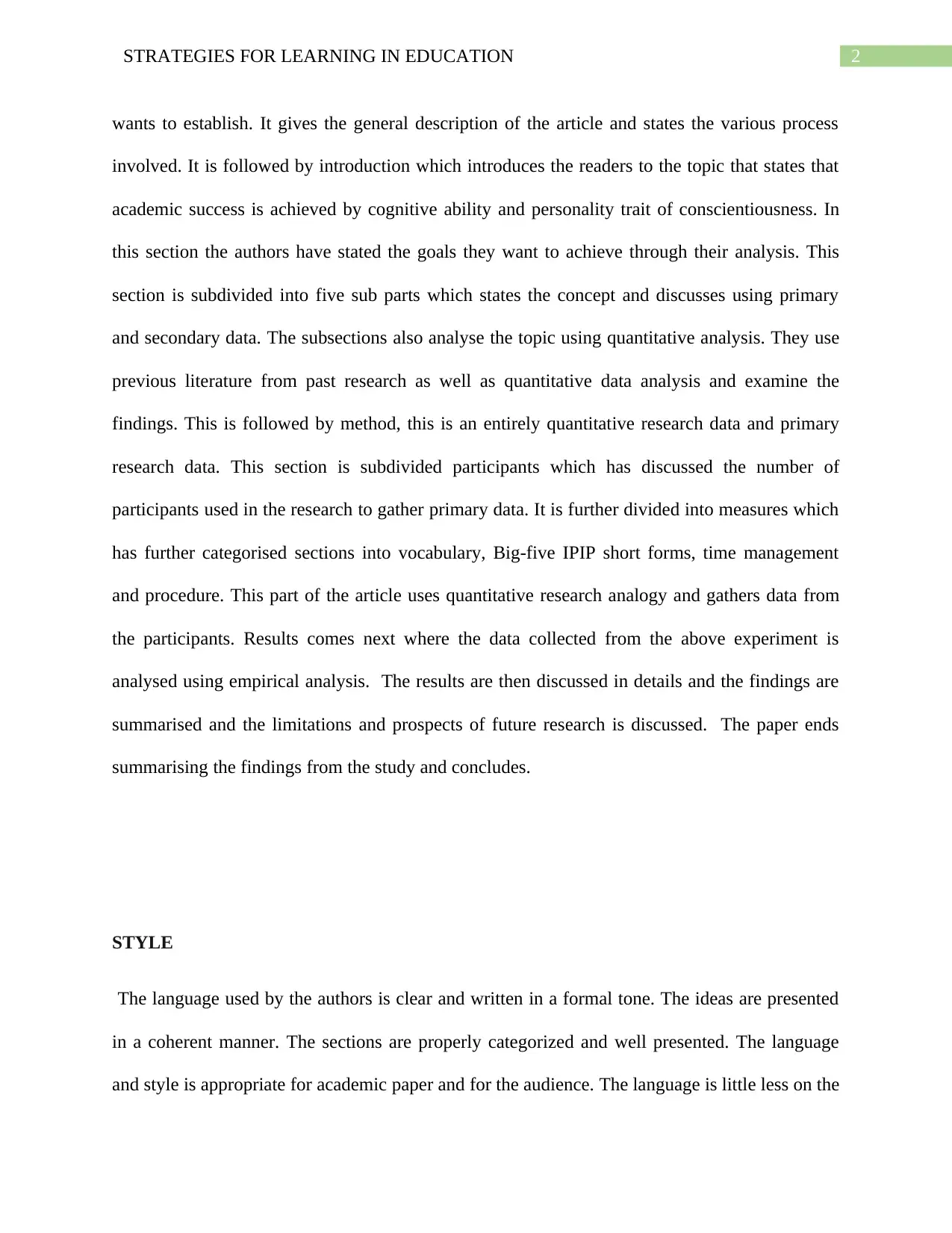
2STRATEGIES FOR LEARNING IN EDUCATION
wants to establish. It gives the general description of the article and states the various process
involved. It is followed by introduction which introduces the readers to the topic that states that
academic success is achieved by cognitive ability and personality trait of conscientiousness. In
this section the authors have stated the goals they want to achieve through their analysis. This
section is subdivided into five sub parts which states the concept and discusses using primary
and secondary data. The subsections also analyse the topic using quantitative analysis. They use
previous literature from past research as well as quantitative data analysis and examine the
findings. This is followed by method, this is an entirely quantitative research data and primary
research data. This section is subdivided participants which has discussed the number of
participants used in the research to gather primary data. It is further divided into measures which
has further categorised sections into vocabulary, Big-five IPIP short forms, time management
and procedure. This part of the article uses quantitative research analogy and gathers data from
the participants. Results comes next where the data collected from the above experiment is
analysed using empirical analysis. The results are then discussed in details and the findings are
summarised and the limitations and prospects of future research is discussed. The paper ends
summarising the findings from the study and concludes.
STYLE
The language used by the authors is clear and written in a formal tone. The ideas are presented
in a coherent manner. The sections are properly categorized and well presented. The language
and style is appropriate for academic paper and for the audience. The language is little less on the
wants to establish. It gives the general description of the article and states the various process
involved. It is followed by introduction which introduces the readers to the topic that states that
academic success is achieved by cognitive ability and personality trait of conscientiousness. In
this section the authors have stated the goals they want to achieve through their analysis. This
section is subdivided into five sub parts which states the concept and discusses using primary
and secondary data. The subsections also analyse the topic using quantitative analysis. They use
previous literature from past research as well as quantitative data analysis and examine the
findings. This is followed by method, this is an entirely quantitative research data and primary
research data. This section is subdivided participants which has discussed the number of
participants used in the research to gather primary data. It is further divided into measures which
has further categorised sections into vocabulary, Big-five IPIP short forms, time management
and procedure. This part of the article uses quantitative research analogy and gathers data from
the participants. Results comes next where the data collected from the above experiment is
analysed using empirical analysis. The results are then discussed in details and the findings are
summarised and the limitations and prospects of future research is discussed. The paper ends
summarising the findings from the study and concludes.
STYLE
The language used by the authors is clear and written in a formal tone. The ideas are presented
in a coherent manner. The sections are properly categorized and well presented. The language
and style is appropriate for academic paper and for the audience. The language is little less on the
⊘ This is a preview!⊘
Do you want full access?
Subscribe today to unlock all pages.

Trusted by 1+ million students worldwide
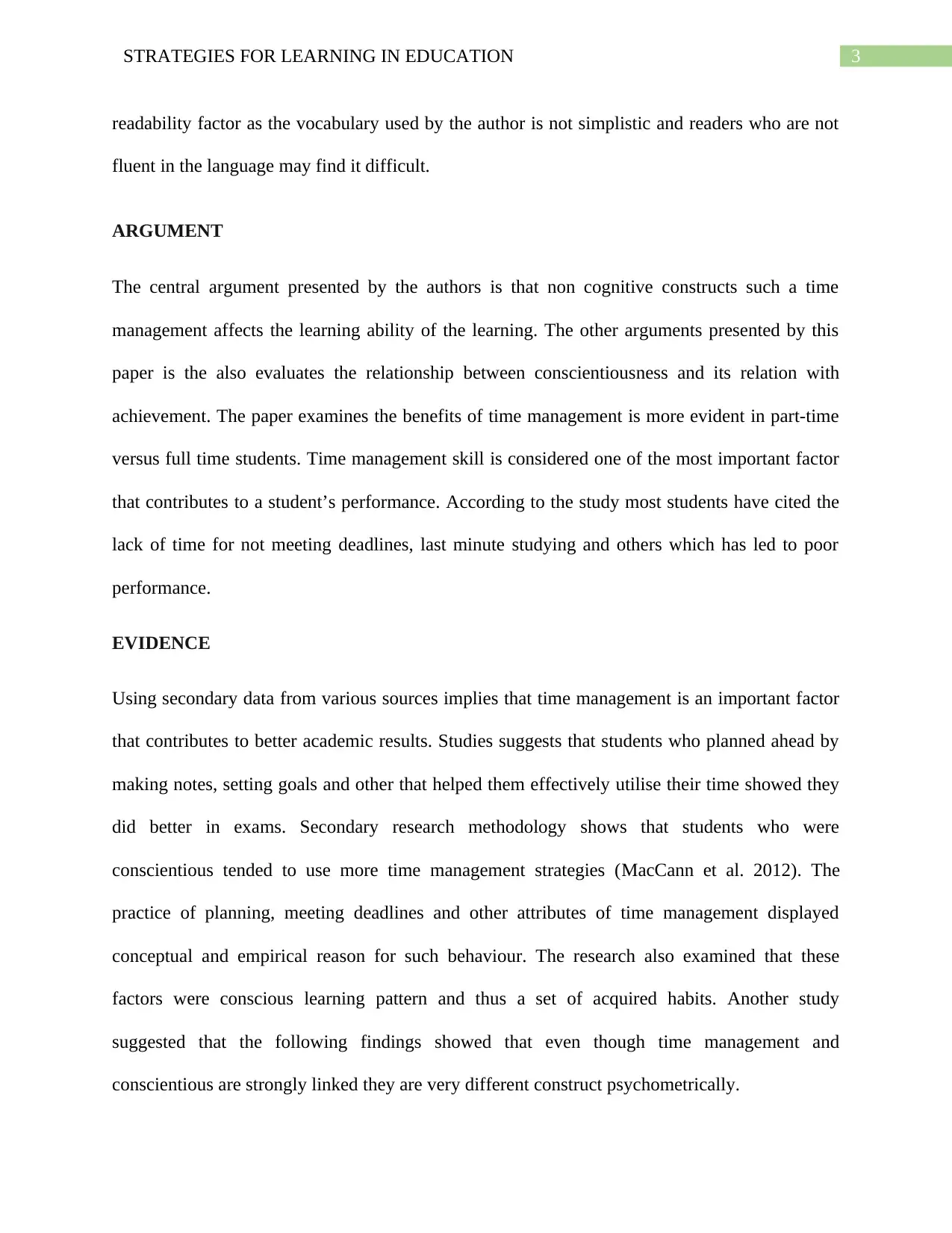
3STRATEGIES FOR LEARNING IN EDUCATION
readability factor as the vocabulary used by the author is not simplistic and readers who are not
fluent in the language may find it difficult.
ARGUMENT
The central argument presented by the authors is that non cognitive constructs such a time
management affects the learning ability of the learning. The other arguments presented by this
paper is the also evaluates the relationship between conscientiousness and its relation with
achievement. The paper examines the benefits of time management is more evident in part-time
versus full time students. Time management skill is considered one of the most important factor
that contributes to a student’s performance. According to the study most students have cited the
lack of time for not meeting deadlines, last minute studying and others which has led to poor
performance.
EVIDENCE
Using secondary data from various sources implies that time management is an important factor
that contributes to better academic results. Studies suggests that students who planned ahead by
making notes, setting goals and other that helped them effectively utilise their time showed they
did better in exams. Secondary research methodology shows that students who were
conscientious tended to use more time management strategies (MacCann et al. 2012). The
practice of planning, meeting deadlines and other attributes of time management displayed
conceptual and empirical reason for such behaviour. The research also examined that these
factors were conscious learning pattern and thus a set of acquired habits. Another study
suggested that the following findings showed that even though time management and
conscientious are strongly linked they are very different construct psychometrically.
readability factor as the vocabulary used by the author is not simplistic and readers who are not
fluent in the language may find it difficult.
ARGUMENT
The central argument presented by the authors is that non cognitive constructs such a time
management affects the learning ability of the learning. The other arguments presented by this
paper is the also evaluates the relationship between conscientiousness and its relation with
achievement. The paper examines the benefits of time management is more evident in part-time
versus full time students. Time management skill is considered one of the most important factor
that contributes to a student’s performance. According to the study most students have cited the
lack of time for not meeting deadlines, last minute studying and others which has led to poor
performance.
EVIDENCE
Using secondary data from various sources implies that time management is an important factor
that contributes to better academic results. Studies suggests that students who planned ahead by
making notes, setting goals and other that helped them effectively utilise their time showed they
did better in exams. Secondary research methodology shows that students who were
conscientious tended to use more time management strategies (MacCann et al. 2012). The
practice of planning, meeting deadlines and other attributes of time management displayed
conceptual and empirical reason for such behaviour. The research also examined that these
factors were conscious learning pattern and thus a set of acquired habits. Another study
suggested that the following findings showed that even though time management and
conscientious are strongly linked they are very different construct psychometrically.
Paraphrase This Document
Need a fresh take? Get an instant paraphrase of this document with our AI Paraphraser
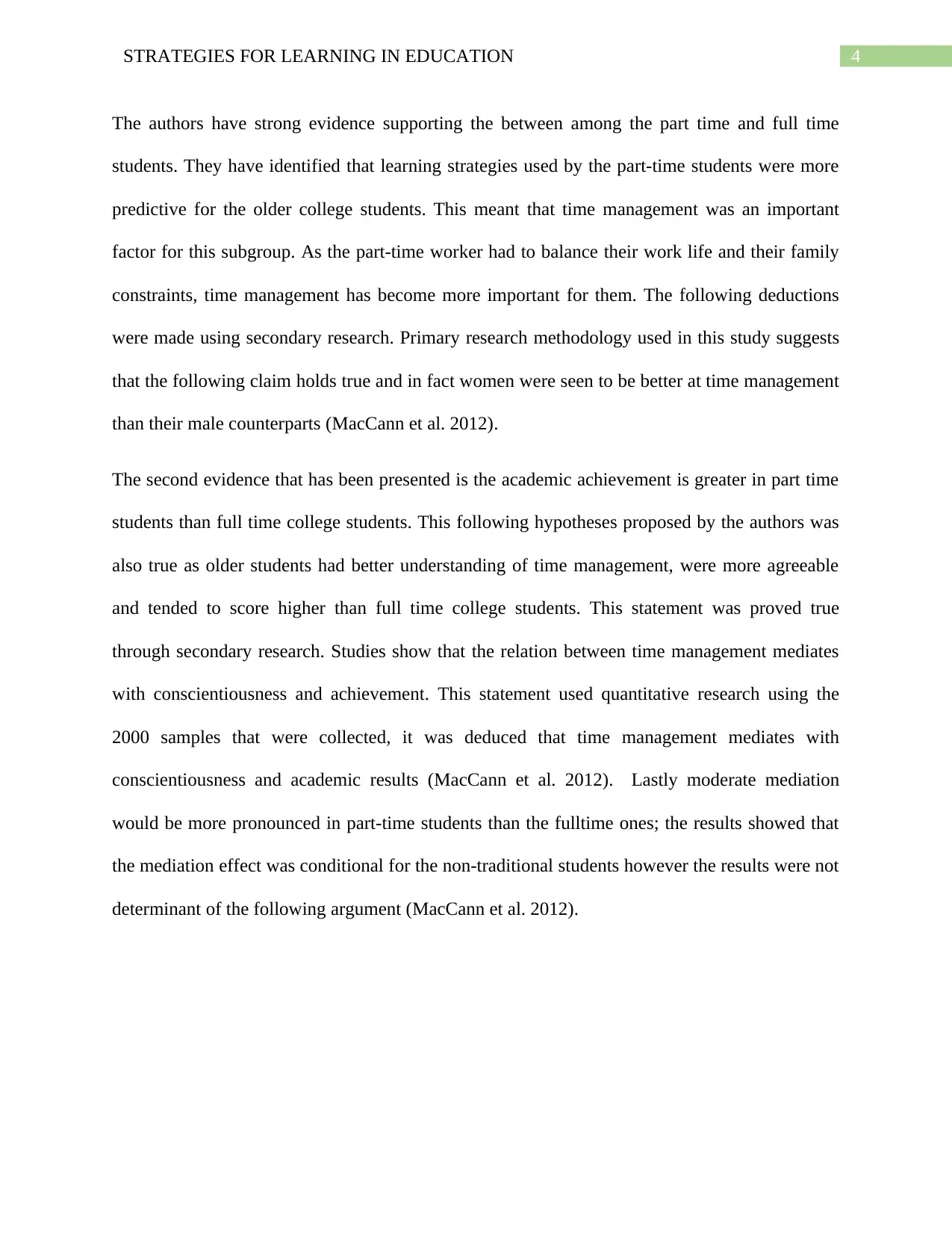
4STRATEGIES FOR LEARNING IN EDUCATION
The authors have strong evidence supporting the between among the part time and full time
students. They have identified that learning strategies used by the part-time students were more
predictive for the older college students. This meant that time management was an important
factor for this subgroup. As the part-time worker had to balance their work life and their family
constraints, time management has become more important for them. The following deductions
were made using secondary research. Primary research methodology used in this study suggests
that the following claim holds true and in fact women were seen to be better at time management
than their male counterparts (MacCann et al. 2012).
The second evidence that has been presented is the academic achievement is greater in part time
students than full time college students. This following hypotheses proposed by the authors was
also true as older students had better understanding of time management, were more agreeable
and tended to score higher than full time college students. This statement was proved true
through secondary research. Studies show that the relation between time management mediates
with conscientiousness and achievement. This statement used quantitative research using the
2000 samples that were collected, it was deduced that time management mediates with
conscientiousness and academic results (MacCann et al. 2012). Lastly moderate mediation
would be more pronounced in part-time students than the fulltime ones; the results showed that
the mediation effect was conditional for the non-traditional students however the results were not
determinant of the following argument (MacCann et al. 2012).
The authors have strong evidence supporting the between among the part time and full time
students. They have identified that learning strategies used by the part-time students were more
predictive for the older college students. This meant that time management was an important
factor for this subgroup. As the part-time worker had to balance their work life and their family
constraints, time management has become more important for them. The following deductions
were made using secondary research. Primary research methodology used in this study suggests
that the following claim holds true and in fact women were seen to be better at time management
than their male counterparts (MacCann et al. 2012).
The second evidence that has been presented is the academic achievement is greater in part time
students than full time college students. This following hypotheses proposed by the authors was
also true as older students had better understanding of time management, were more agreeable
and tended to score higher than full time college students. This statement was proved true
through secondary research. Studies show that the relation between time management mediates
with conscientiousness and achievement. This statement used quantitative research using the
2000 samples that were collected, it was deduced that time management mediates with
conscientiousness and academic results (MacCann et al. 2012). Lastly moderate mediation
would be more pronounced in part-time students than the fulltime ones; the results showed that
the mediation effect was conditional for the non-traditional students however the results were not
determinant of the following argument (MacCann et al. 2012).
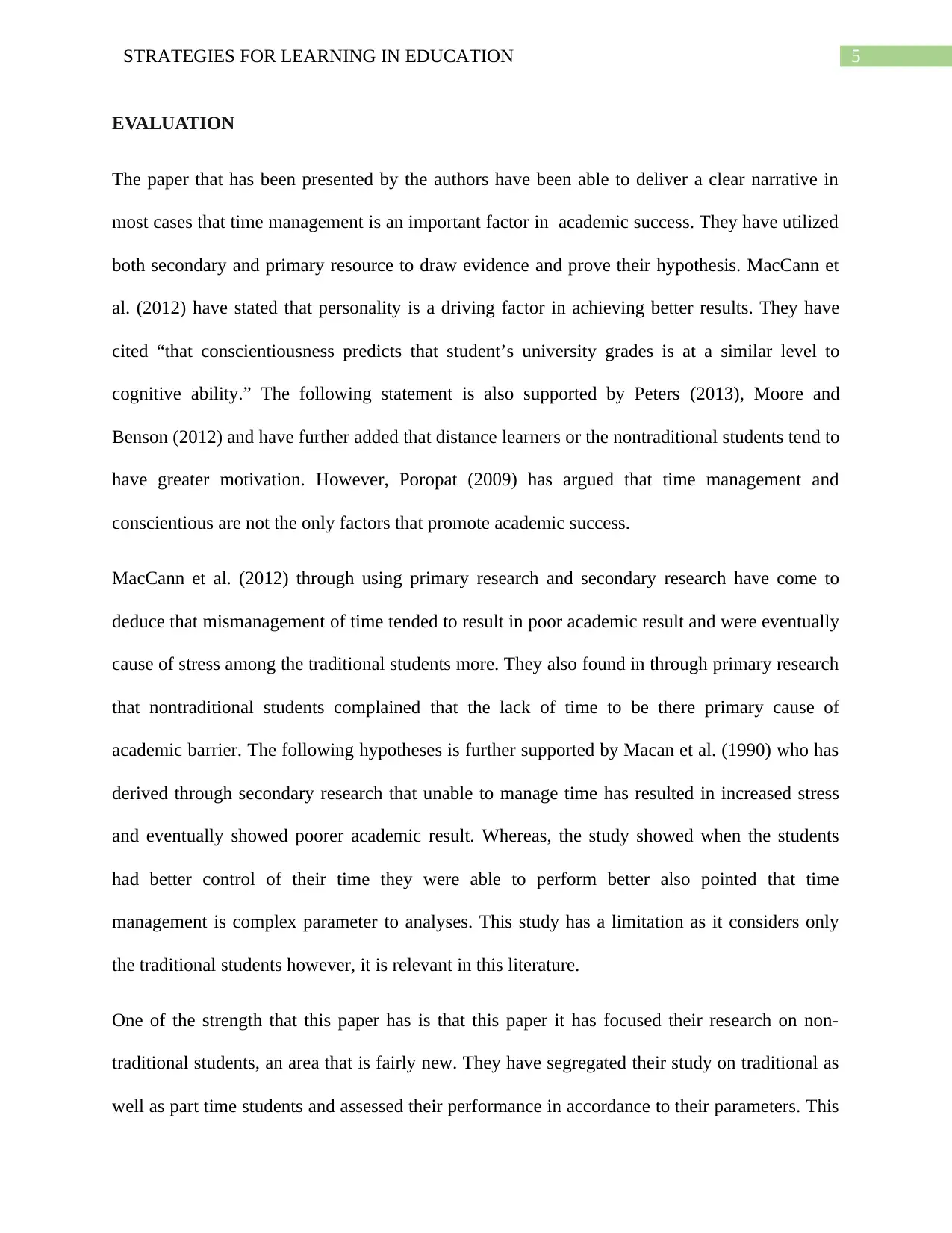
5STRATEGIES FOR LEARNING IN EDUCATION
EVALUATION
The paper that has been presented by the authors have been able to deliver a clear narrative in
most cases that time management is an important factor in academic success. They have utilized
both secondary and primary resource to draw evidence and prove their hypothesis. MacCann et
al. (2012) have stated that personality is a driving factor in achieving better results. They have
cited “that conscientiousness predicts that student’s university grades is at a similar level to
cognitive ability.” The following statement is also supported by Peters (2013), Moore and
Benson (2012) and have further added that distance learners or the nontraditional students tend to
have greater motivation. However, Poropat (2009) has argued that time management and
conscientious are not the only factors that promote academic success.
MacCann et al. (2012) through using primary research and secondary research have come to
deduce that mismanagement of time tended to result in poor academic result and were eventually
cause of stress among the traditional students more. They also found in through primary research
that nontraditional students complained that the lack of time to be there primary cause of
academic barrier. The following hypotheses is further supported by Macan et al. (1990) who has
derived through secondary research that unable to manage time has resulted in increased stress
and eventually showed poorer academic result. Whereas, the study showed when the students
had better control of their time they were able to perform better also pointed that time
management is complex parameter to analyses. This study has a limitation as it considers only
the traditional students however, it is relevant in this literature.
One of the strength that this paper has is that this paper it has focused their research on non-
traditional students, an area that is fairly new. They have segregated their study on traditional as
well as part time students and assessed their performance in accordance to their parameters. This
EVALUATION
The paper that has been presented by the authors have been able to deliver a clear narrative in
most cases that time management is an important factor in academic success. They have utilized
both secondary and primary resource to draw evidence and prove their hypothesis. MacCann et
al. (2012) have stated that personality is a driving factor in achieving better results. They have
cited “that conscientiousness predicts that student’s university grades is at a similar level to
cognitive ability.” The following statement is also supported by Peters (2013), Moore and
Benson (2012) and have further added that distance learners or the nontraditional students tend to
have greater motivation. However, Poropat (2009) has argued that time management and
conscientious are not the only factors that promote academic success.
MacCann et al. (2012) through using primary research and secondary research have come to
deduce that mismanagement of time tended to result in poor academic result and were eventually
cause of stress among the traditional students more. They also found in through primary research
that nontraditional students complained that the lack of time to be there primary cause of
academic barrier. The following hypotheses is further supported by Macan et al. (1990) who has
derived through secondary research that unable to manage time has resulted in increased stress
and eventually showed poorer academic result. Whereas, the study showed when the students
had better control of their time they were able to perform better also pointed that time
management is complex parameter to analyses. This study has a limitation as it considers only
the traditional students however, it is relevant in this literature.
One of the strength that this paper has is that this paper it has focused their research on non-
traditional students, an area that is fairly new. They have segregated their study on traditional as
well as part time students and assessed their performance in accordance to their parameters. This
⊘ This is a preview!⊘
Do you want full access?
Subscribe today to unlock all pages.

Trusted by 1+ million students worldwide
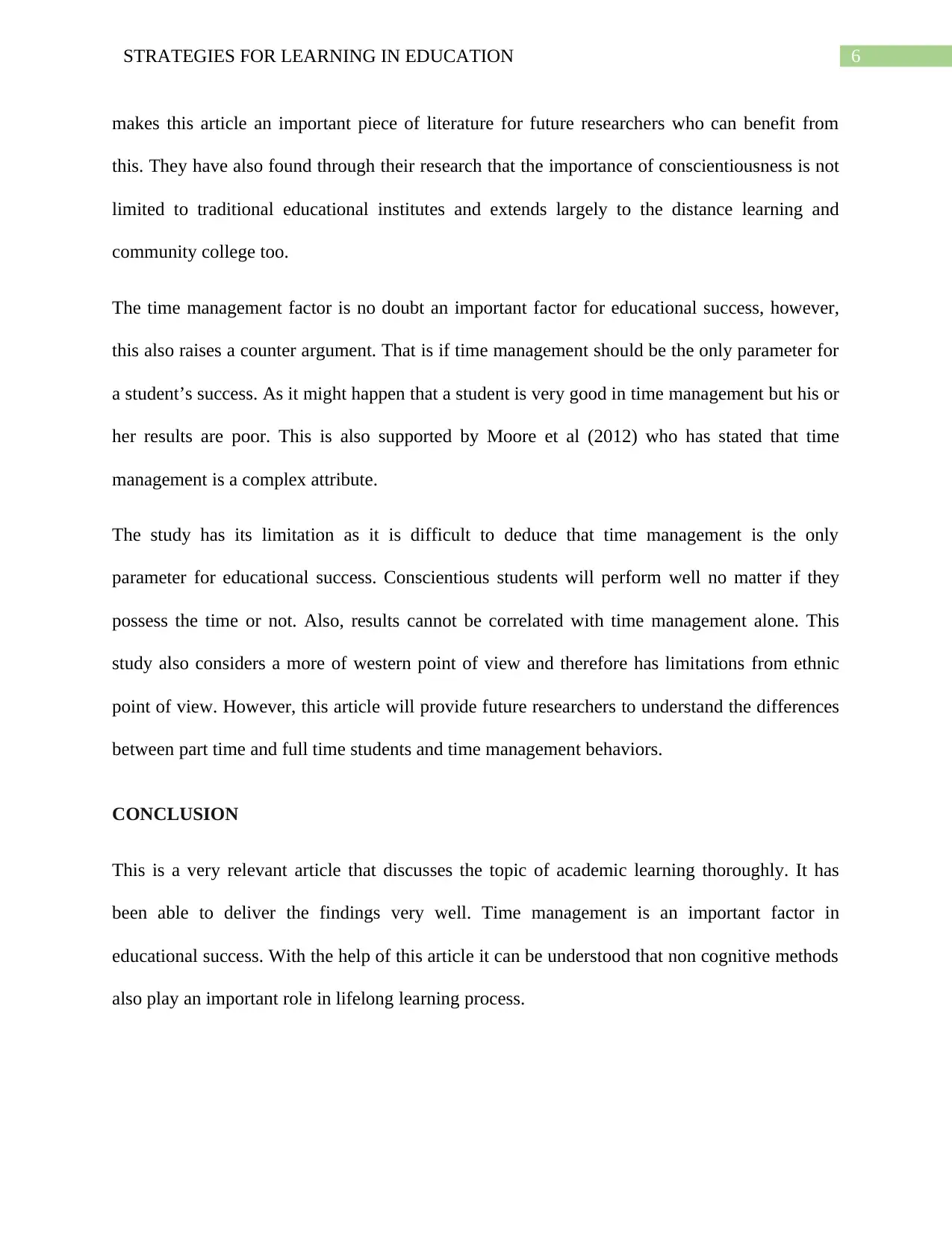
6STRATEGIES FOR LEARNING IN EDUCATION
makes this article an important piece of literature for future researchers who can benefit from
this. They have also found through their research that the importance of conscientiousness is not
limited to traditional educational institutes and extends largely to the distance learning and
community college too.
The time management factor is no doubt an important factor for educational success, however,
this also raises a counter argument. That is if time management should be the only parameter for
a student’s success. As it might happen that a student is very good in time management but his or
her results are poor. This is also supported by Moore et al (2012) who has stated that time
management is a complex attribute.
The study has its limitation as it is difficult to deduce that time management is the only
parameter for educational success. Conscientious students will perform well no matter if they
possess the time or not. Also, results cannot be correlated with time management alone. This
study also considers a more of western point of view and therefore has limitations from ethnic
point of view. However, this article will provide future researchers to understand the differences
between part time and full time students and time management behaviors.
CONCLUSION
This is a very relevant article that discusses the topic of academic learning thoroughly. It has
been able to deliver the findings very well. Time management is an important factor in
educational success. With the help of this article it can be understood that non cognitive methods
also play an important role in lifelong learning process.
makes this article an important piece of literature for future researchers who can benefit from
this. They have also found through their research that the importance of conscientiousness is not
limited to traditional educational institutes and extends largely to the distance learning and
community college too.
The time management factor is no doubt an important factor for educational success, however,
this also raises a counter argument. That is if time management should be the only parameter for
a student’s success. As it might happen that a student is very good in time management but his or
her results are poor. This is also supported by Moore et al (2012) who has stated that time
management is a complex attribute.
The study has its limitation as it is difficult to deduce that time management is the only
parameter for educational success. Conscientious students will perform well no matter if they
possess the time or not. Also, results cannot be correlated with time management alone. This
study also considers a more of western point of view and therefore has limitations from ethnic
point of view. However, this article will provide future researchers to understand the differences
between part time and full time students and time management behaviors.
CONCLUSION
This is a very relevant article that discusses the topic of academic learning thoroughly. It has
been able to deliver the findings very well. Time management is an important factor in
educational success. With the help of this article it can be understood that non cognitive methods
also play an important role in lifelong learning process.
Paraphrase This Document
Need a fresh take? Get an instant paraphrase of this document with our AI Paraphraser
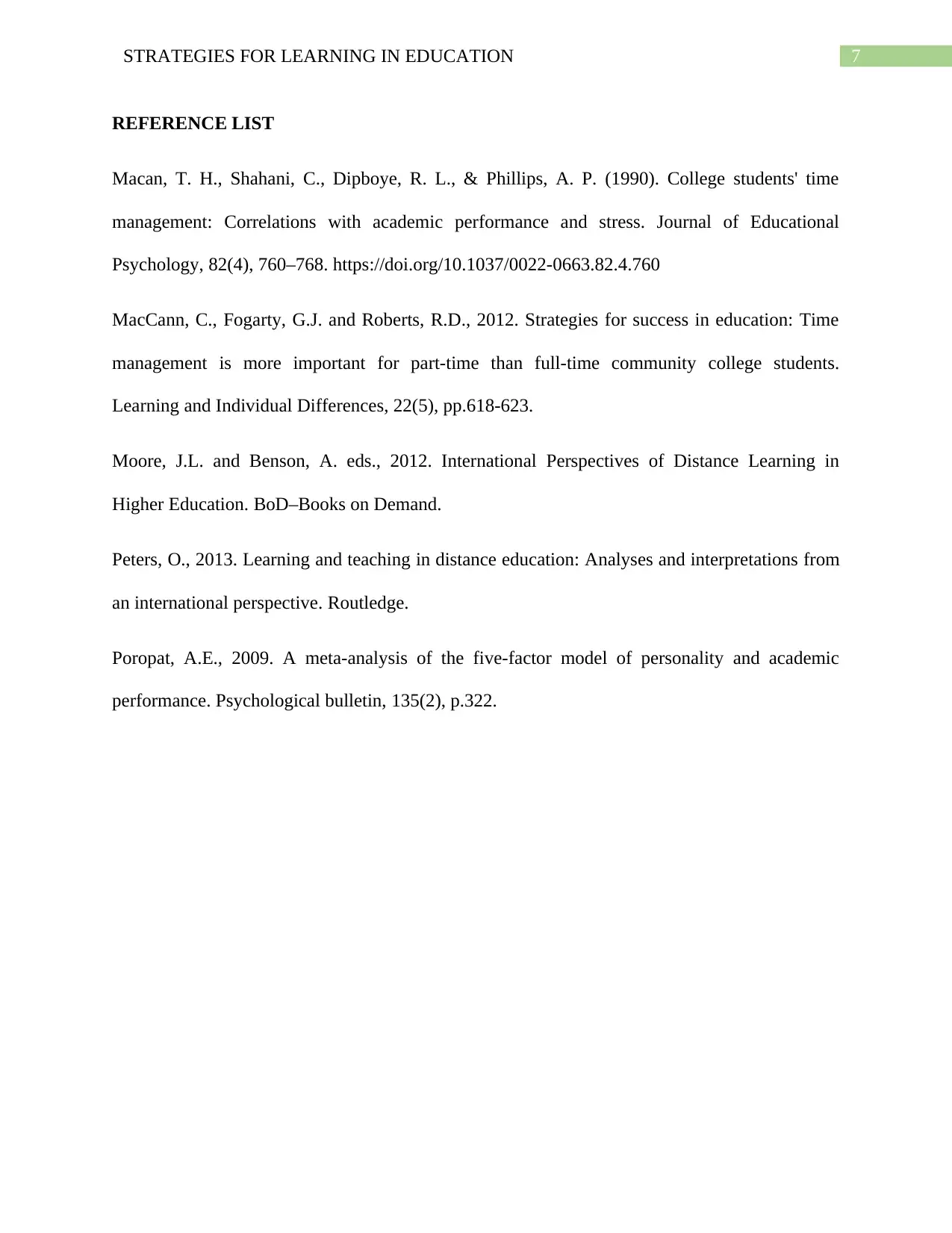
7STRATEGIES FOR LEARNING IN EDUCATION
REFERENCE LIST
Macan, T. H., Shahani, C., Dipboye, R. L., & Phillips, A. P. (1990). College students' time
management: Correlations with academic performance and stress. Journal of Educational
Psychology, 82(4), 760–768. https://doi.org/10.1037/0022-0663.82.4.760
MacCann, C., Fogarty, G.J. and Roberts, R.D., 2012. Strategies for success in education: Time
management is more important for part-time than full-time community college students.
Learning and Individual Differences, 22(5), pp.618-623.
Moore, J.L. and Benson, A. eds., 2012. International Perspectives of Distance Learning in
Higher Education. BoD–Books on Demand.
Peters, O., 2013. Learning and teaching in distance education: Analyses and interpretations from
an international perspective. Routledge.
Poropat, A.E., 2009. A meta-analysis of the five-factor model of personality and academic
performance. Psychological bulletin, 135(2), p.322.
REFERENCE LIST
Macan, T. H., Shahani, C., Dipboye, R. L., & Phillips, A. P. (1990). College students' time
management: Correlations with academic performance and stress. Journal of Educational
Psychology, 82(4), 760–768. https://doi.org/10.1037/0022-0663.82.4.760
MacCann, C., Fogarty, G.J. and Roberts, R.D., 2012. Strategies for success in education: Time
management is more important for part-time than full-time community college students.
Learning and Individual Differences, 22(5), pp.618-623.
Moore, J.L. and Benson, A. eds., 2012. International Perspectives of Distance Learning in
Higher Education. BoD–Books on Demand.
Peters, O., 2013. Learning and teaching in distance education: Analyses and interpretations from
an international perspective. Routledge.
Poropat, A.E., 2009. A meta-analysis of the five-factor model of personality and academic
performance. Psychological bulletin, 135(2), p.322.
1 out of 8
Related Documents
Your All-in-One AI-Powered Toolkit for Academic Success.
+13062052269
info@desklib.com
Available 24*7 on WhatsApp / Email
![[object Object]](/_next/static/media/star-bottom.7253800d.svg)
Unlock your academic potential
Copyright © 2020–2026 A2Z Services. All Rights Reserved. Developed and managed by ZUCOL.





